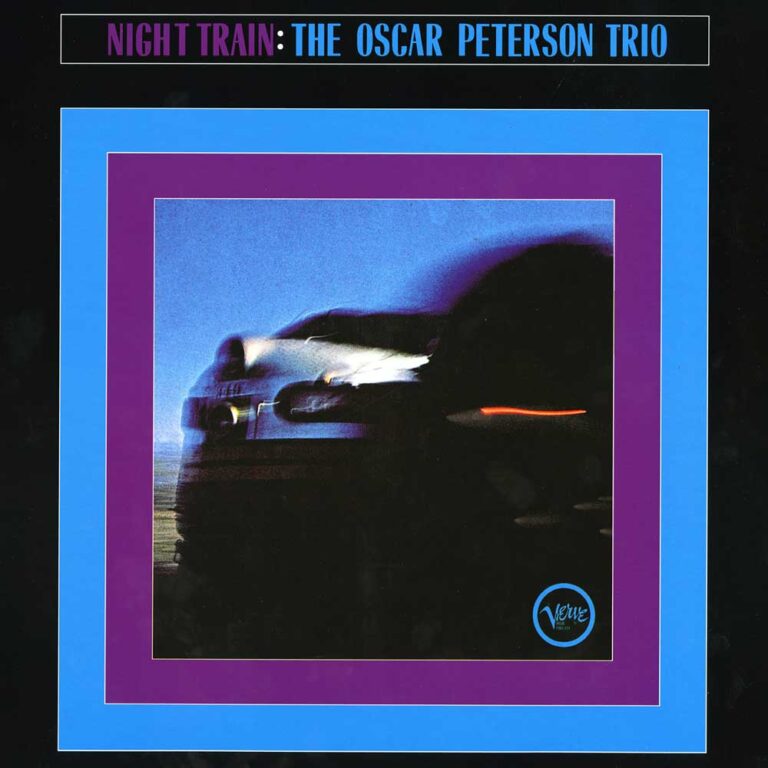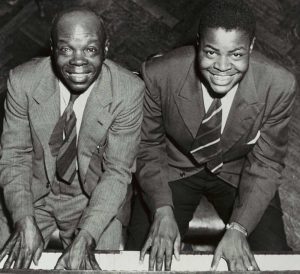Determined to be a professional musician from a young age, Oscar Peterson (1925-2007) took in his father’s unequivocal message: in order to live his dream, he would have to become not just a good pianist, but the best. This was the only way to escape a similar destiny, predetermined by race and colour. Like most black men, the elder Peterson had been relegated to work on the Canadian railroad, earning his living as a porter – the only job whites were willing to offer men of colour at the time.
Oscar Peterson’s path to become one of the finest pianists in the history of music had everything to do with his identity as a black man in a highly racialized society. His father’s words resonated with those of Marcus Garvey, who he heard speak about the need to be purposeful, and get beyond the railway. Excelling, captivating audiences, and gaining international recognition, he did just that.
Born in 1925, Peterson grew up in an integrated neighbourhood in Montreal. Though jazz clubs were not segregated, as they were in the United States, social justice was far from reality. People were taking to the streets in protest, demanding change. “There were no black artists on the radio at the time,” Peterson recounts in the documentary film In The Key Of Oscar (NFB, 1991). Radio announcers, though glowing in their reviews of his artistry, used racist, insulting comments. “When I heard them, I had a goal in mind. . . I wanted to get to where I had some clout,” he recalls.
Peterson chose music as his response to social and racial injustice. The “Africa” suite was inspired in part by the struggle for human rights in apartheid South Africa, featuring “Nigerian Marketplace,” “Peace,” written with great hope for South Africa, and “The Fallen Warrior,” composed for and dedicated to Nelson Mandela, who was imprisoned at the time. One of his film projects, Fields of Endless Day (CBC, 1978), recounts the story of slaves using the Underground Railroad to escape from the United States to Canada.

Oscar Peterson Trio Night Train
Available to purchase from our US store.“Hymn to Freedom,” Peterson’s best-known and perhaps most beloved composition, was written in 1962, with the work of Dr. Martin Luther King Jr. and the fight for liberty and justice in mind. Composed spontaneously, it was conceived in the studio while recording “Night Train,” one of Peterson’s most well-received albums, produced by iconic jazz impresario Norman Granz. Though not a bluesy album, Granz had the vision of closing the set with a spiritual tune that would have an early blues feel.

Peterson decided to evoke this deeply emotive quality by reaching for “a Baptist-type church approach,” as he writes. “I tried, to the best of my ability, to recall the various church renderings of numerous Negro spirituals that I grew up with, and within this form I attempted to construct the melodic and harmonic first chorus.”
“After I finished the first chorus, I looked up at Ray [Brown] and Ed [Thigpen] and nodded for them to join me on the tune. They did so, with Ray taking a two-beat approach to the bass line, and Ed joined in softly with his brushes. During the improvised solo passages that followed, I glanced up at the control room glass, and could see Norman with his eyes closed and his head buried in his hands. As the blues spiritual deepened, we all seemed to react with exactly the same impetus. When it was over, Norman came into the studio smiling and said something about, “That’s the way you guys should have played this whole session.”
— Oscar Peterson
Embraced by Dr. King as the unofficial anthem of the Civil Rights Movement, “Hymn to Freedom” reverberated around the world. “I had the honour of being present in Aachen, Germany to hear the Deutsche Welle Choir of fifty voices perform it at the ceremony during which I was given the [2000] UNESCO International Music Prize,” recalls Peterson. The song was also performed by the French National Orchestra and the Radio France choir as part of a concert in support of Ukraine.
In December 2022, sixty years after it was composed, a special trio consisting of Peterson’s protégé, Benny Green, together with bassist John Clayton and drummer Jeff Hamilton, gathered to commemorate the legacy of this impactful composition, recording a poignant rendition that is “a healing balm for the soul,” as one fan wrote.
“It has that feeling of something that has always been,” muses Kelly Peterson, Mr. Peterson’s widow and archivist. The song was inducted into the Canadian Songwriters’ Hall of Fame in March of 2008, only a few months after the pianist’s passing. Ms. Peterson, in attendance, had the opportunity to meet the song’s lyricist, Harriette Hamilton. “Those were the easiest I’d ever written,” she shared. The lyrics were penned about a year after the song had already been recorded. “Night Train” got really famous,” notes Ms. Peterson, “and so did this song. Norman [Granz] thought it should have lyrics, and asked Harriet, who worked with the Malcolm Dodds Singers, to write them.” The words would “express in very simple language the hope for unity, peace and dignity for mankind,” Hamilton reflected.
“Ironically, when you think about it, musicians and performers have done this for years; they’ve gone out on stage and worked with one another, this race with that race, this type of person with that type of person… with no problems,” reflects Peterson in In The Key Of Oscar. “So I guess that means we’re going to have to change the world into a world of performers, so that they understand what love is all about.”
Hymn to Freedom
When every heart joins every heart and together yearns for liberty,
That’s when we’ll be free.
When every hand joins every hand and together moulds our destiny,
That’s when we’ll be free.
Any hour any day, the time soon will come when men will live in dignity,
That’s when we’ll be free.
When every man joins in our song and together singing harmony,
That’s when we’ll be free.
Read on…Oscar Peterson – Master Pianist, Prolific Composer
Sharonne Cohen is a Montreal-based writer and editor. Passionate about arts, culture and the creative imagination, she has been a music journalist since 2001, contributing to publications including DownBeat, JazzTimes, Okayplayer, VICE/Noisey, Afropop Worldwide, The Revivalist, and La Scena Musicale. Her photographs often accompany her writing.
Header image: Oscar Peterson and his father, Daniel, playing piano. Photo: Library and Archives Canada/Oscar Peterson fonds/e011073129.


